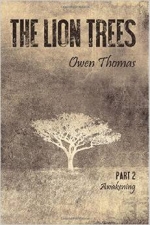Title: The Lion Trees
Author: Owen Thomas
Publisher: OTF Literary
ISBN: 978-0692248379
Pages: 802
Genre: Fiction
Reviewed by: James F. Sadler, Pacific Book Review
Book Review
Let me just start by saying I loved The Lion Trees – and you will too. This is a powerful, gripping andrealistic story.
Once, a few decades ago, many authors would set out to write “The Great American Novel,” hoping to
tap into whatever it is which makes the US and its people so unique and hopeful, particularly at a set
point in time. The Grapes of Wrath comes to mind as such a novel.
These days it doesn’t seem like anyone tries to write those kind of seminal novels anymore… until
now. I don’t know that The Lion Trees will be held in this regard by others, but it certainly struck a
nerve with me and I hope one day it comes to be considered a “Great American Novel.”
The story is lengthy, over 2,150 pages, but never dull. Don’t be intimated by the length. The novel is
worth every minute you spend wrapped inside its world. At the center of the novel are Matilda-
“Tilly”- and David, and their parents, Hollis and Susan Johns. There is a fifth family member, Ben, a
mentally challenged son who lives with his parents. The majority of the chapters focus on one of the
four, and the author uses this to good effect when we see, for instance, the differing points of views
and references of each of them at times when they interact with one another, even going so far as to
change the point of view of the narrative at times. This alteration of the narration is an interesting
plot machinations demonstrating Owen Thomas’ skill as an author.
Tilly is an actress, one originally known mostly for getting naked and having affairs with her directors,
but now earning respect for a recent role which earned her an Academy Award nomination. David is a
school teacher, fighting an uphill battle against students who mostly don’t give a damn about learning.
Hollis is a retired banker, with a bit of a drinking problem, who spends much of his time huddled away
in the basement, contemplating eastern philosophy, and avoiding his wife. Then there is Susan, a wife
and mother who was beginning to regret past opportunities she did not pursue and trying to exert
herself as an individual by getting involved volunteering with political groups.
A brief prologue introduces us to Matilda, late in her life, lying down a bit of intrigue regarding the
story to come. As we come to learn, Tilly is making a sci-fi movie, “The Lion Tree.” It’s based upon a
story by an author named Angus Mann and being directed by Blair Gaines, who is determined to
perfectly translate the story from print to film. Problems mount and tensions build, resulting in Gains
ditching the project and starting it over from scratch, causing Tilly angst and problems also.
David is a fairly dedicated educator, trying hard to convince his students to learn. Underpaid, and
occasionally dependent on his father for financial help, David loves teaching high school, while his
father continually pushes for him to move up the ladder and teach in college. David makes the
mistake of running into a student at a club and when she turns up missing, finds himself the primary
suspect in her missing person case.
Hollis is clearly not enjoying retirement, in fact, there are hints that he was forced to retire. In fact,
he has come to despise his wife, doing all he can to avoid her. His interests, and his hopes for a
different future, are roused when the daughter of a Japanese acquaintance visits to check out grad
schools, and Hollis offers to show her around and introduce her to his banker friends, hoping she
might land an internship.
Susan has just found herself reinvigorated by volunteering in a failed political campaign, and now
wants to do more, including going to an upstate workshop. Of course, she also is worried about Ben,
since she has been his primary caregiver and doesn’t necessarily trust Hollis to take care of him.
From these varied points, the book grows and entangles the reader in the lives of these people.
Author Owen Thomas tells a “slow, careful story”- a reference to the prologue, and you’ll be glad he
did. This is a wonderful, well thought out, well written tale, worth every minute, every hour, and every
day that you spend in it. Mr. Thomas’ style is straightforward and easy (even with the various dialects
he employs perfectly). He uses simple, detail oriented diction, creating a wonderful base on which to
build such a story. The Lion Trees does what so very few great novels can: it will take a lot out of
you, but leave you with much more than you had when you began.


